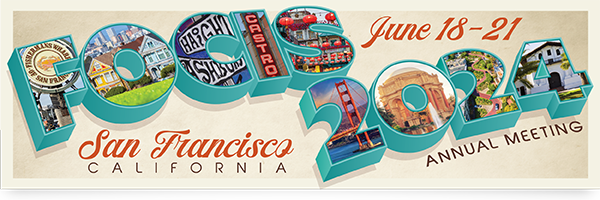The FOCIS 2024 Annual Meeting is THE meeting in translational immunology. FOCIS brings together leading clinicians and researchers delivering the latest breakthroughs across immunology.
Featured Speakers:
Here are the FOCIS 2024 Featured Speakers:
| Galit Alter, PhD | Federico Mingozzi, PhD |
| Michael Angelo, MD, PhD | Maria Mittelbrunn, PhD |
| Montserrat Anguera, PhD | Devan Moodley, PhD |
| Dusan Bogunovic, PhD | Michelle Monje, MD, PhD |
| Esther Borges Florsheim, PhD | Robert Montgomery, MD, PhD |
| Howard Chang, MD, PhD | Gustavo Mostoslavsky, MD, PhD |
| Hongbo Chi, PhD | Cathryn Nagler, PhD |
| Isaac Chiu, PhD | Yanay Ofran, PhD |
| Judy Cho, MD | Jose Ordovas-Montanes, PhD |
| Megan Cooper, MD, PhD | Sung-Yun Pai, MD |
| Susan De Wolf, MD | Ciriaco Piccirillo, PhD |
| Melanie Dispenza, MD, PhD | Bali Pulendran, PhD |
| Michal Elovitz, MD | Gabriel Rabinovich, PhD |
| Wassim Elyaman, PhD | Rima Rachid, MD |
| Anthony Filiano, PhD | Aviv Regev, PhD |
| Matthieu Giraud, PhD | Sonja Schrepfer, MD, PhD |
| Monica Guzman, PhD | Helen Su, MD, PhD |
| Ashley Harms, PhD | Megan Sykes, MD |
| Curtis Henry, PhD | Qizhi Tang, PhD |
| Bana Jabri, MD, PhD | Steve Van Dyken, PhD |
| Kwang-Soo Kim, PhD | Lisa Wagar, PhD |
| Kei Kishimoto, PhD | Sing Sing Way, MD, PhD |
| Megan Levings, PhD | Ana Claudia Zenclussen, PhD |
| Michail Lionakis, MD, ScD | Linqi Zhang, PhD |
| Florencia McAllister, MD |
Plenary Sessions
- Immunology in Reproductive Health
- Mechanisms & Treatment of Autoimmunity
- Neuroimmunology
- Novel Pathways and Approaches in Allergic Disease
- Precision Therapeutics in Mucosal Disorders
- Somatic Mosaicism, Clonal Populations, and Immune Disorders
Thematic Sessions
- Behavioral Immunology and Neuroimmunology
- Cellular & Stem Cell Therapeutics
- Host Defense and Vaccinology
- Immune Responses to GT/Therapeutics
- Immuno-oncology
- Inborn Errors of Immunity
- Metabolic Regulation of Inflammation
- Organoid Modeling & Therapeutics
- Systems Immunology & AI
Speaker Biographies
Robert A. Montgomery, MD, DPhil, FACS
NYU Langone Transplant Institute
Dr. Robert A. Montgomery is the Chairman and Professor of Surgery at NYU Langone Health and the Director of the NYU Langone Transplant Institute. He received his Doctor of Medicine with Honor from the University of Rochester School of Medicine. He received his Doctor of Philosophy from Balliol College, The University of Oxford, England in Molecular Immunology. Montgomery completed his general surgical training, multi-organ transplantation fellowship, and postdoctoral fellowship in Human Molecular Genetics at Johns Hopkins. For over a decade he served as the Chief of Transplant Surgery and the Director of the Comprehensive Transplant Center at Johns Hopkins.
Dr. Montgomery was part of the team that developed the laparoscopic procedure for live kidney donation, a procedure that has become the standard throughout the world. He and the Hopkins team conceived the idea of the Domino Paired Donation (kidney swaps), the Hopkins protocol for desensitization of incompatible kidney transplant patients, and performed the first chain of transplants started by an altruistic donor. He led the team that performed the first 2-way domino paired donation, 3-way paired donation, 3-way domino paired donation, 8-way multi-institutional domino paired donation, and co-led the first 10-way open chain. He is credited in the 2010 Guinness Book of World Records with the most kidney transplants performed in 1 day. He is considered a world expert on kidney transplantation for highly sensitized and ABO incompatible patients and is referred the most complex patients from around the globe.
Dr. Montgomery has had clinical and basic science research supported by the NIH throughout his career. He has authored over 300 peer reviewed articles, cited more than 30,000 times and has an h-index of 95. His academic interests include HLA sensitization, tolerance protocols including simultaneous solid organ and bone marrow transplantation, bioartificial organs and xenotransplantation. He has received important awards and distinctions including a Fulbright Scholarship and a Thomas J. Watson Fellowship and memberships in the Phi Beta Kappa and Alpha Omega Alpha academic honor societies. He has been awarded multiple scholarships from The American College of Surgeons and The American Society of Transplant Surgeons. The National Kidney Foundation of Maryland has recognized his contributions to the field of transplantation with the Champion of Hope Award, the National Kidney Registry with the Terasaki Medical Innovation Award and The Greater New York Hospital Association with the Profile in Courage Award. Newsweek Magazine featured him as one of America’s Greatest Disruptors in December 2021. He received the Liberty Science Center’s 2022 Genius Award. Modern Healthcare named him one of the Top 25 Innovators in Healthcare for 2022. Also in 2022, he was recognized by Crain’s New York Business as a Notable Health Care Leader. He received the 2022 American Association of Kidney Patients Medal of Excellence Award. The American Society for Histocompatibility and Immunogenetics named him the winner of the 2022 Paul I. Terasaki Clinical Science Award. Dr. Montgomery became the recipient of a heart transplant in 2018 and has become known for his advocacy for transplant patients.
Megan Sykes, MD, FOCIS President
Columbia University
Megan Sykes’ research career, during which she has published >440 papers and book chapters, has focused on hematopoietic cell transplantation, organ allograft tolerance induction, xenotransplantation tolerance and Type 1 diabetes. Dr. Sykes has developed novel strategies for achieving graft-versus-tumor effects without graft-versus-host disease following hematopoietic cell transplantation (HCT). She developed an approach that has been evaluated in clinical trials of non-myeloablative haploidentical HCT whose safety and efficacy allowed trials of HCT for the induction of organ allograft tolerance, allowing intentional achievement of tolerance in humans for the first time. Dr. Sykes has dissected the tolerance mechanisms and pioneered minimal conditioning approaches for using HCT to achieve allograft and xenograft tolerance. Her work on xenogeneic thymic transplantation for tolerance induction has led, for the first time, to long-term kidney xenograft survival in non-human primates. She has extended the HCT approach to the problem of reversing autoimmunity while replacing destroyed islets of Langerhans in Type 1 diabetes. She has developed novel “humanized mouse” models that allow personalized analysis of human immune disorders and therapies. Dr. Sykes believes that a mechanistic understanding of manipulations used to achieve clinical goals is essential to the translation of these manipulations to the clinic. It is for this reason that she has consistently worked at the interface between basic science and clinical applications, and has been able to translate her research to new treatments for patients requiring bone marrow or organ transplants. Dr. Sykes is a Past President of the International Xenotransplantation Association, served as Vice President of TTS, has repeatedly served on TTS Council and is a member of the Institute of Medicine of the National Academies and of the Association of American Physicians. She has received many honors and awards, including the 2018 Medawar Prize.
In 2010, after 20 years at Massachusetts General Hospital and Harvard Medical School, Dr. Sykes moved to Columbia University to establish the Columbia Center for Translational Immunology (CCTI). The CCTI is a multidisciplinary research center whose scope includes transplantation (organ and bone marrow), autoimmune disease, tumor immunology, infectious immunity and basic immunology. Currently, the CCTI has a staff of >100 scientists and support staff, including 17 faculty members. Dr. Sykes’ own laboratory program currently includes major projects in the area of xenograft tolerance induction in humanized mouse models; unique humanized mouse models for the analysis and treatment of autoimmune diseases, including Type 1 diabetes and rheumatoid arthritis (the “personalized immune” mouse); studies of lymphocyte turnover, chimerism and T cell trafficking in patients receiving intestinal and liver transplants; tracking of alloreactive T cells in human transplant recipients; and both pre-clinical and clinical studies of non-myeloablative hematopoietic cell transplantation for the induction of allograft tolerance.
Bana Jabri, MD, PhD
University of Chicago
Biography is coming soon.
Aviv Regev, PhD
Genentech
Aviv Regev is the head of Genentech Research and Early Development. Prior to Genentech, Regev served as Chair of the Faculty and Core Member at the Broad Institute of MIT and Harvard, and as Professor of Biology at MIT and Investigator at the Howard Hughes Medical Institute. She is a founding co-chair of the Human Cell Atlas. Regev is a leader in deciphering molecular circuits that govern cells, tissues and organs in health and their malfunction in disease. Her lab has pioneered foundational experimental and computational methods in single-cell genomics, working toward greater understanding of the function of cells and tissues in health and disease, including autoimmune disease, inflammation and cancer. She is a member of the National Academy of Sciences and National Academy of Medicine, and a Fellow of the International Society of Computational Biology. She is a recipient of multiple prizes and honors, including receiving the 2023 L’Oreal-UNESCO Women In Science Award.


